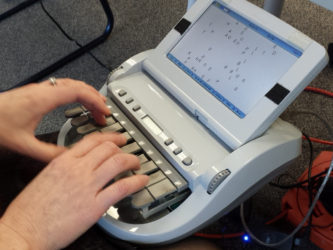
The legal system can seem stuffy, hidebound and resistant to change. But firms like court reporting agency CourtScribes are changing that.
And that’s very much a good thing. The changes the court reporting agency and others are bringing about amount to a revolution in the courthouse that will bring costs down and democratize access to the legal system.
Courtscribes sees the changes as an opportunity rather than a threat.
Cloud computing combined with digital and audio advances put Courtscribes ahead of the pack when it comes to both the accuracy and cost of its court reporting.
“CourtScribes is changing the court reporting industry by using Internet age technology to create the official record of court proceedings, using remote transcriptionists and charging attorneys up to 50% less than what they now pay, and as … a disruptive technology will not only improve the quality of services, but also ultimately extend and even democratize the use of services that are today often restricted only to high profile or high dollar value cases,” writes Barry Unger, a professor and entrepreneur, in a white paper.
CourtScribes’ services include:
- An experienced court reporter oversees recording equipment and takes simultaneous notes. Digital annotations are time-linked to the recording so it’s a simple process to find and listen to actual testimony.
- Each primary participant in the proceeding is given a discreet sound channel so that each voice is distinct, eliminating confusion caused by cross talk. “This voice isolation feature permits a full and accurate transcription of exactly what was said — and who said it — because each channel can be listened to individually,” Unger writes.
- Because of the quality of the recordings, court reporters are less obtrusive than in more traditional court stenography. Unger writes, “The recording process captures all words exactly as spoken — then in transcription the audio can be replayed as needed to verify verbatim accuracy.”
- Lawyers or other interested parties can obtain copies of the digital recording as well as the transcript, and, “With digital annotations directly “hot-linked” to the audio, points of interest are located quickly and efficiently,” Unger writes.
- Notes and audio files can be delivered over the Internet. Unger writes, “Both log notes and audio files are transmitted over the Internet, reducing or eliminating shipping costs and delivery delays. Storage and archiving are efficient and compact. When the audio and log notes are saved as computer files, there are no cassettes to store, nor files of reporters’ paper notes to maintain.”
